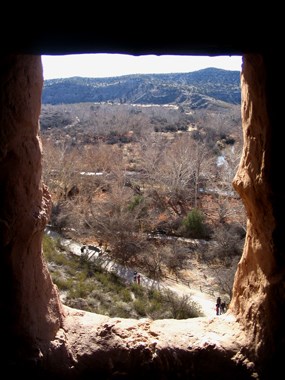
NPS Photo by Paul Ollig Peering through a window high on the fourth level of Montezuma Castle, you can watch as people explore the trails or gaze across the valley at Beaver Creek winding its way past the towering cliffs. On a busy day in the Monument, there may be several hundred visitors moving around on the trails below the Castle. Was it that much different 700 years ago? What did it look like when this was a vibrant community of 300 individuals? Where were the corn fields? How many pit houses could you see from this window? From 80 feet above on the cliff it is easy to pick out individual voices on the trails below. On any given day you may hear English, German, Dutch, Spanish and Japanese. What did the language of the Sinagua sound like? What did they talk about? 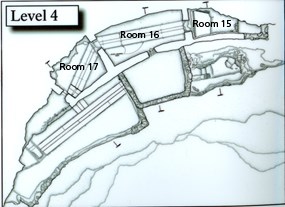
NPS Image Level four of the Castle contains only three rooms, one of which consists of just a floor remnant just above the ladder used to access level four from level three. The other two rooms consist of modified natural alcoves with modern plankways and hand railings installed when the Castle was open to the public. 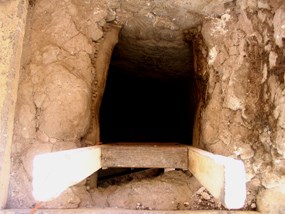
NPS Photo by Paul Ollig From level four there is only one last ladder to climb to access the topmost floor of Montezuma Castle. On either side of the access hole, pictured here, you can see some of the stick and mud thatching that makes up the floors and ceilings throughout the Castle. 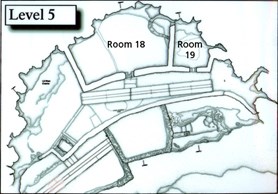
NPS Image The uppermost rooms in the Castle do not contain any ladders at all, and are both located behind one of the most unique features at Montezuma Castle, the parapet. This "railing", which from below simply looks like the top of the wall directly above the central tower, is the only one of its kind found in ancient pueblo ruins throughout the American Southwest. It was formed by extending the wall above the level of the floor, which is indicated on the outer wall by the support beams extending outside of the masonry. The exact reason for its construction has never been discovered. 
NPS Photo by Paul Ollig No evidence has ever been found to suggest that any humans lived inside the Castle after the Sinagua abandoned it 600 years ago. Today, the local wildlife are the only inhabitants of Montezuma Castle. Bats roost in nearly every room, as evidenced by the incredible amounts of scat that collects on the floors. Other mammalian residents include rock squirrels, grey fox, and the secretive ringtail, pictured here. During the spring and summer months, cliff swallows can be seen building their bowl-shaped mud nests on the ledges above the Castle. 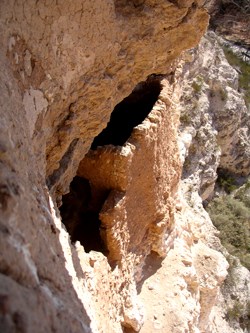
NPS Image by Paul Ollig Level five is entirely protected by the limestone cliff overhang directly overhead. The view from here is spectacular, but also gives us a glimpse at the rest of the Castle. These rooms, located on the third level, would have been covered with a thatch roof. Looking down from this height, it is difficult to imagine mothers feeling safe with their children running around next to a 100+ foot drop to the cliff's bottom. 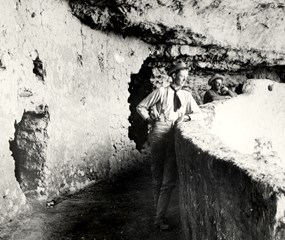
NPS Image This undated photograph (probably around 1910) shows the height of the parapet protecting level five of the Castle. Was it constructed by demand of nervous mothers afraid of their children falling from the balcony? This image also illustrates some of the damage caused by looters and pot-hunters prior to the Castle's protection as a national monument. As extensive as this damage was, Montezuma Castle has remained one of the best preserved cliff dwellings in North America. |
Last updated: December 9, 2024
